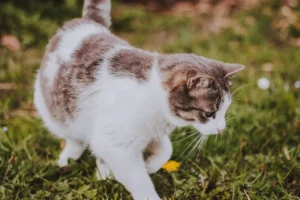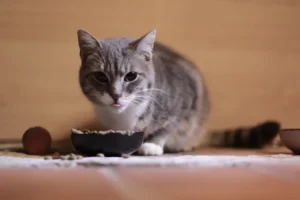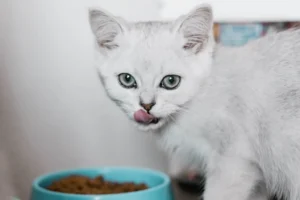Cats have a well-known aversion to water that often leaves owners puzzled. But why are cats so sensitive to water? Let’s explore the reasons behind this common feline trait.
Natural Instincts
Cats’ sensitivity to water can be traced back to their wild ancestors. Wildcats, the predecessors of domestic cats, lived in dry, arid climates where water was scarce. As a result, they evolved to be wary of water to survive in their environment. This instinct has been passed down through generations, leading domestic cats to exhibit similar behaviors. So, when your cat acts skittish around water, it’s simply following its natural instincts developed over thousands of years.
Fur Protection
One key reason why cats are sensitive to water lies in their furry coat. A cat’s fur is designed to repel water and keep it dry. The structure of a cat’s fur prevents water from reaching its skin, providing insulation and protecting against moisture. Cats spend a lot of time grooming themselves to maintain the integrity of their coats. So, next time your cat gives you the cold shoulder after a bath, remember that it’s just trying to protect its fur from getting wet.
Additional Insight:
Did you know that cats have specialized sebaceous glands near the base of their hairs? These glands secrete oils that help waterproof their fur, making it resistant to water. This adaptation further enhances their ability to stay dry and cozy even in rainy weather.
Grooming Habits
Cats are notorious for their meticulous grooming habits, spending a significant portion of their day licking themselves clean. This grooming routine not only helps them remove dirt and debris from their fur but also serves as a method of regulating body temperature. The cat’s saliva has a cooling effect on their skin, helping to keep them comfortable in warmer temperatures.
Moreover, when a cat gets wet, it interferes with their natural grooming process. Wet fur becomes heavy and clumps together, making it difficult for the cat to groom effectively. This can lead to matting and skin irritations, which are not only uncomfortable for the cat but can also pose health risks.
Therefore, cats’ aversion to water can be attributed to their desire to maintain a clean and dry coat through their meticulous grooming routine. So, the next time your feline friend gives you a dirty look for suggesting a bath, remember it’s not just about being a diva – it’s about keeping that luxurious coat in top shape!
Temperature Regulation
Cats are known for being heat-seeking creatures, often lounging in sunny spots to soak up warmth. However, their love for warmth comes with a caveat – cats have a higher body temperature than humans, ranging from 100.5°F to 102.5°F. When a cat’s fur gets wet, it disrupts their ability to insulate and regulate body temperature effectively.
A cat’s body temperature can drop rapidly when wet, leading to discomfort and potential health issues. Wet fur acts as a conductor, drawing heat away from the cat’s body and causing them to feel cold and vulnerable. This sudden drop in body temperature can also weaken their immune system, making them more susceptible to illnesses.
To maintain their comfort and health, cats instinctively avoid water as much as possible. So, the next time your kitty gives you the cold shoulder after an accidental splash, remember they’re just trying to stay cozy and healthy – nothing personal!
Additional Insight: Some experts believe that cats’ sensitivity to water may also stem from their ancestors’ evolutionary history. Wild felines, like their big cat relatives, typically inhabit dry environments and are not natural swimmers. This aversion to water may have been passed down through generations, contributing to cats’ general dislike for getting wet.
Sensory Discomfort
Did you know that cats are ultra sensitive to water due to their whiskers and skin? These little fur detectors serve as their GPS system, helping them navigate their surroundings. When cats get wet, their whiskers become heavy and waterlogged, causing sensory overload and discomfort. This can be incredibly off-putting for our feline friends, leading them to avoid water at all costs. So next time you see your cat giving you the stink eye after a bath, remember, it’s not personal – it’s just their whiskers doing their job!
Lack of Swimming Skills
Most cats aren’t exactly born to be Michael Phelps in the water – in fact, they are not natural swimmers at all. Unlike some of their canine counterparts, cats aren’t equipped with the same swimming abilities. Their bodies are not built for buoyancy, making it challenging for them to stay afloat in water. This lack of swimming skills plays a major role in their aversion to getting wet, as they instinctively know that water is not their friend when it comes to staying above the surface. So if your cat gives you an icy glare when you suggest a swim, just remember they’re not being rude – they’re just not born with those Aquaman genes.
Insightful Tip: If you’re trying to introduce your cat to water, start by providing them with a shallow bowl to dip their paws in. This gradual exposure can help them get more accustomed to the sensation of water over time.
Behavioral Conditioning
When it comes to why cats are sensitive to water, behavioral conditioning plays a significant role. Cats may develop a fear or sensitivity to water due to negative experiences, such as baths or getting caught in the rain. These unpleasant encounters can leave a lasting impact, reinforcing their aversion to getting wet. So, if your kitty had a traumatic bath experience in the past, it’s no wonder they run for cover at the mere sound of a dripping faucet.
Alternative Hygiene Methods
Ever wondered why cats seem to have an aversion to water? Well, one reason could be their unique hygiene habits. Cats are meticulous groomers, using their rough tongues to lick themselves clean. This self-cleaning process eliminates the need for water baths, unlike many other animals. Additionally, cats have adapted to using a sand-like litter for their bathroom needs, providing them with a convenient and water-free way to maintain cleanliness. So next time your cat avoids the water bowl, remember they have their own purr-fect methods of staying clean.
Here’s a tip: You can help your sensitive cat by providing alternative grooming techniques like using cat wipes or specialized dry shampoos to keep them clean without the need for water.
Fun Facts About Cats and Water
Cats’ sensitivity to water stems from their ancestors who lived in dry climates and did not encounter water often. This aversion has been passed down through generations, making most cats resistant to getting wet. However, there are always exceptions to the rule, with some felines enjoying a dip or a playful splash from time to time.
Did you know that not all cats hate water? Breeds like the Turkish Van and the Bengal actually enjoy taking a swim. These water-loving felines have unique coats that make them more buoyant and resistant to getting soaked.
Interestingly, cats are meticulous groomers because their saliva acts as a natural deodorant and cleaning agent. Since cats groom themselves regularly, they generally do not need frequent baths. This self-grooming behavior also contributes to their reluctance to get wet, as they prefer to control their cleanliness on their terms.
Tips for Dealing with a Water-Averse Cat
Use a Dry Shampoo : If your cat gets into something sticky or smelly, opt for a dry shampoo specifically designed for felines. This way, you can cleanse your cat without the need for a water bath.
Employ Brushing and Wipes : Regular brushing can help remove dirt and debris from your cat’s fur, reducing the need for baths. Additionally, pet wipes are convenient for spot cleaning and freshening up your cat in between grooming sessions.
Invest in a Waterless Shampoo : Waterless shampoos are a great alternative for cats who detest traditional baths. Simply spray on, massage in, and towel dry for a clean and refreshed kitty.
Create a Positive Association : If your cat needs to get wet for medical reasons or grooming, try associating the experience with treats, toys, or calm reassurance. Positive reinforcement can help alleviate your cat’s stress and make the process more manageable.
Provide Adequate Hydration : Since cats can be finicky about their water source, ensure they have a clean and fresh water bowl available at all times. Some cats prefer running water, so investing in a cat fountain may encourage them to drink more.
Remember, every cat is different, so patience and understanding are key when addressing your water-averse feline’s needs. By exploring alternatives and finding what works best for your cat, you can ensure they stay clean, healthy, and happy without the stress of a water bath.
Alex, a passionate animal lover, has experience in training and understanding animal behavior. As a proud pet parent to two dogs and three cats, he founded AnimalReport.net to share insights from animal experts and expand his knowledge of the animal kingdom.




